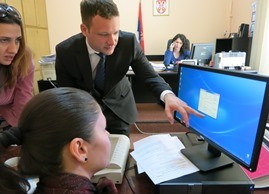
Aug. 2014—The large number of old pending cases is a major challenge facing Serbia’s courts. Faster court proceedings and improved efficiency of the judicial system depend on several factors, most importantly, good case management and communication.
To help make this process easier, USAID’s Separation of Powers Program has introduced electronic filing—a revolutionary service allowing courts and other parties involved to instantaneously and securely exchange documents via email.
“The objective of this type of communication is to allow the parties to access the court more quickly and easily. Attorneys can communicate with the court at all times, on weekends or during the night. They don’t have to come to the court building and they don’t have to go to the post office,” explained Acting Court President Rozalija Tumbas of the basic court in Subotica.
E-filing offers not only increased efficiency, but also enormous cost savings for the courts and the affected parties. The speedy exchange of official documents leads to savings on printing and postage, and expedited communication reduces the length and cost of case proceedings. These are real, concrete improvements that can be measured in days and dinars.
Additionally, the more timely sharing of information results in greater transparency. Attorneys in basic courts in Subotica and Užice and the commercial court in Zaječar have been able to easily verify information they have exchanged with the courts through the web portal.
“When I was given this opportunity, I was very excited about it and I wanted to start using it as soon as possible. I believe that my colleagues felt the same way. That’s why we started with the implementation very quickly,” explained Subotica attorney Nenad Vuletic.
During March and April 2014, USAID helped the three courts reorganize their supporting services to allow legal, efficient and secure electronic communication between courts and attorneys. To facilitate this change, the three courts signed a memorandum of cooperation with a small group of interested lawyers.
In cooperation with the Supreme Court of Cassation and the Ministry of Justice, USAID legal staff reviewed the legal framework for electronic communication and developed procedural and technical guidelines for the exchange of documents and subpoenas via email. The transactions are authenticated by electronic signatures and secure time-stamps issued by the Serbian Post Office.
Electronic exchanges of information are expected to increase as more attorneys and courts come to understand the tremendous benefits. E-filing will not only reduce the cost of paper in the long run, but immediate access to documents via a computerized document management system will allow the court to process documents faster and reduce case disposition times.
“I expect that an ever-increasing number of attorneys and courts will switch to doing business this way,” said Brian LeDuc, chief of party of USAID’s Separation of Powers Program, during the launch of the new service.
In addition to e-filing, basic courts in Subotica and Užice have cooperated extensively with USAID and are among 10 partner courts operating a successful Backlog Reduction Program, which demonstrated the feasibility of the National Plan adopted by the Supreme Court this year.
The Separation of Powers Program runs from 2009 through 2014.
LINKS
Follow @USAIDSerbia, on Facebook, on YouTube







Comment
Make a general inquiry or suggest an improvement.